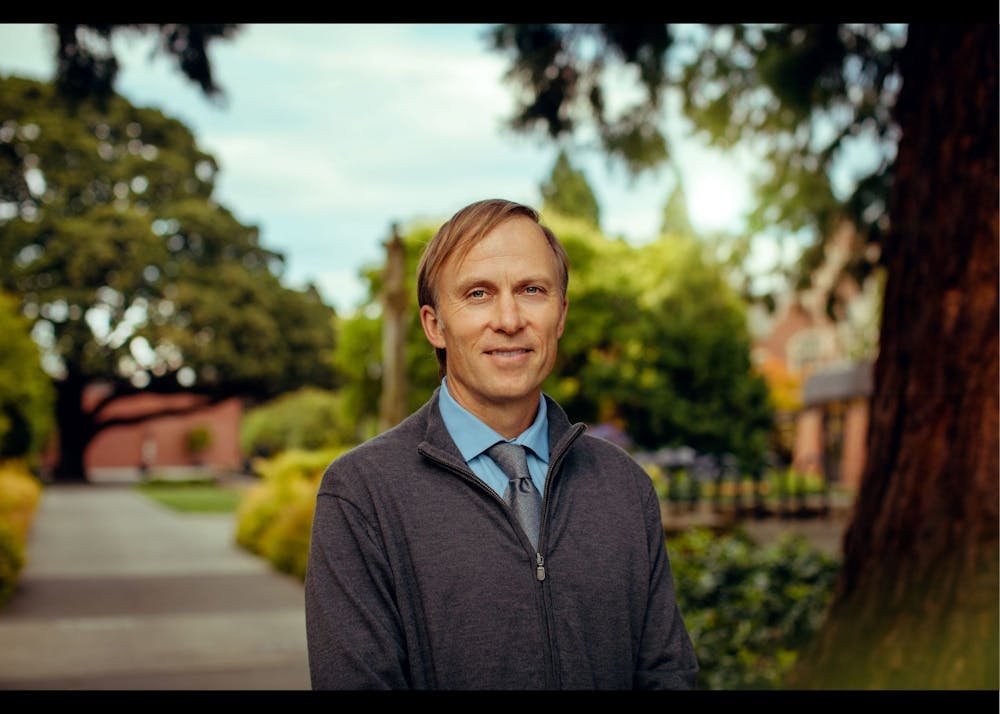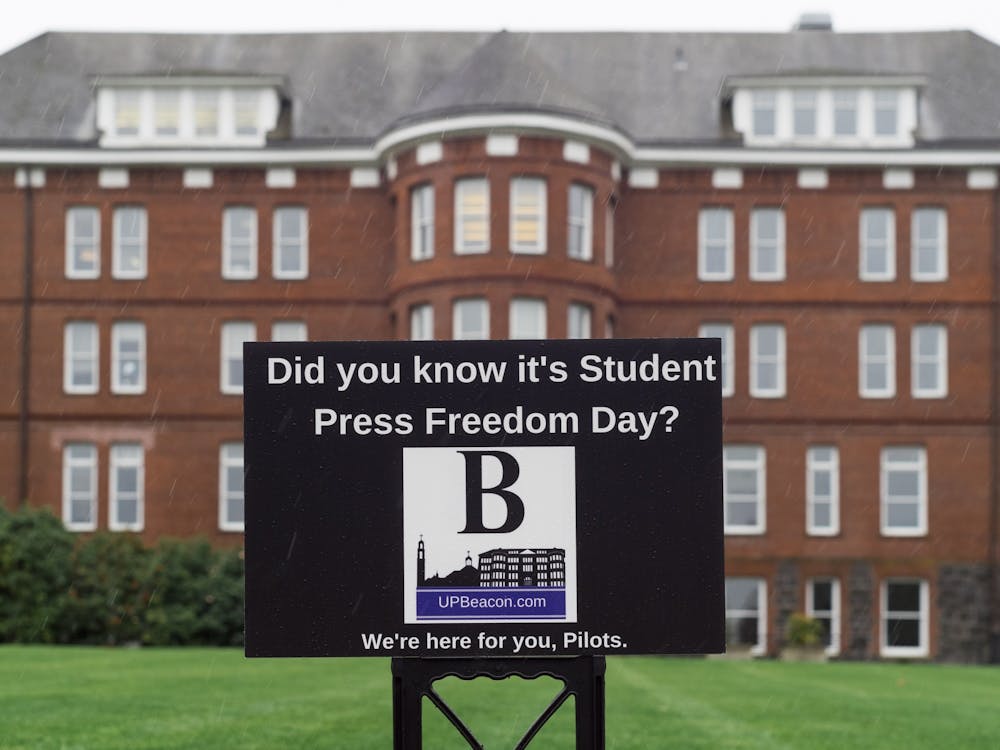Dear UP Community,
I’m writing partially in response to the March 9th Opinion piece on “Changing the core curriculum.” While that piece was framed as a letter addressed to Fr. Poorman, Provost Medina, and the Board of Regents, this academic year I started in a role new to UP of “Core Curriculum Director” and am tasked in part with shepherding our revitalized Core through its implementation — which is scheduled in phases beginning with new first year students in the Fall of 2021. The letter from Caroline Dockerty, Lauren Carlos, Shayla Hoeft, Liam McDonough and Riley Farrell offers a number of important points related to our Core, and thus seems to provide a useful opportunity to offer an update about what is already in process for the revitalized Core.
While these updates will not satisfy all the letter’s concerns, it is a good-faith effort to suggest that successful advocacy often starts with shared understanding and community engagement. I particularly want to acknowledge and appreciate the points in the letter about the importance of listening to diverse voices. During this most challenging year, the hard work of listening to each other while striving for a more just and inclusive educational community is an essential work in progress.
On curricular matters, it’s worth starting by emphasizing that the University Core is the set of required courses designed to provide a broad liberal arts foundation for all academic programs at UP. That design also means the Core is an important shared community space where we define our academic identity. For better and (sometimes) for worse, a university curriculum tends to change slowly because it is deeply interdependent with many different programs of study and because it is designed to offer enduring knowledge, skills and values using multiple disciplinary lenses that are likely to stand the test of time. UP’s Core has not had a major revision in two decades, and thus revitalizing the Core curriculum was a key part of the last University strategic plan.
The revitalization process began with surveying of faculty and students in the Spring of 2017, proceeded through interactive programming to learn from other institutions and stakeholders in 2017 to 2018, and was enacted by a Core Curriculum Revitalization Committee (that included student representation) working between the Fall of 2018 and the Spring of 2020. That group presented a revitalized Core proposal which was approved by UP’s Academic Senate during the 2019-2020 academic year, and my Core director role began this academic year with the goal of phased implementation beginning next Fall. While much has changed at UP and in the wider world during this multi-year process, the revitalized Core has been designed intentionally to evolve and integrate new ideas while also maintaining many of the enduring values that characterize a UP education.
While the revitalized Core starting next academic year will have many new features, and while I’d be happy to hear from any community members interested in further updates, most of the issues raised in “Changing the core curriculum” focus on diversity, equity and inclusion. So I will focus here on those pieces. First, it is important to acknowledge that the existing Core has not done enough to ensure students engage issues of equity and racial justice, and has not been intentional enough in representing perspectives and ideas from voices historically marginalized, particularly those minoritized in academia. During the Core revitalization process, this was made clear by student voices on the Core Revitalization Committee, who made a compelling case that it was possible to get through the Core without having to engage issues such as racism. There have always been individual classes and faculty members at UP engaging such issues inside and outside the classroom, but we need to do better with intentional design across the curriculum.
To address this need, the revitalized Core curriculum involves a Foundation Level of courses that distributes course requirements across six “Habits of Heart and Mind” that include both “Diversity, Inclusion, and the Common Good” and “Global and Historical Consciousness.” The current Core does have a “Diversity and Difference” requirement, but in the current Core that requirement could be met in many different ways that may or may not involve directly engaging with racial justice, diverse global cultures, or social inequities. By requiring students to take at least one course that explicitly addresses “Diversity, Inclusion, and the Common Good” and also at least one course that explicitly involves “Global and Historical Consciousness”, we are working to ensure all students directly engage with equity, identity, and racial justice issues in the Core. While some of these courses are the same courses in the current Core, faculty teaching “Diversity, Inclusion, and the Common Good” courses are being prioritized for support that will allow them to redesign courses in ways that are true to the liberal arts while also better meeting student needs and our current cultural moment.
The revitalized Core will also have a new “Exploration Level” that requires all students to take two courses that use multidisciplinary lenses from the liberal arts to address issues of enduring concern. This new level will not be fully implemented until the 2022-2023 academic year, and details for courses are still being finalized. We have, however, had active conversations with faculty involved in the “Imagining our Futures” course proposed as a model in the “Changing the core curriculum” letter, and have plans in place to include such a course as a signature Core course that brings together the UP community to wrestle with critical issues such as racism, climate change, global pandemics and others.
This curricular design would not require any single course at the Exploration Level for all students because of essential values including breadth and personal exploration. But we do hope and expect Exploration Level classes will be another opportunity to undertake the critical work of diversity, equity, and inclusion and to invite all UP students (and faculty) to reflect on their own work toward those ends.
One further addition to the revitalized Core is a new one-credit “Anchor Seminar,” which will be an evolution of the current first-year workshop to integrate an academic introduction to UP and the Core. While this course is currently in design for the Fall of 2021, its broad goals include creating community, shaping healthy identities, introducing diverse ways of knowing, and imbuing a sense of hope for students’ time at UP and beyond. There will be much to cover in a one hour course, but through these goals it also will provide opportunities to better engage issues of equity, identity, and justice.
The “Changing the core curriculum” letter also notes the importance of integrating perspectives from the prospective Ethnic Studies program, and we do see and are excited about many potential spaces in the revitalized curriculum for such integration. Because that program has not yet started, we do not yet know the specific ways it might contribute to the Core. But I, like many students, look forward to a robust Ethnic Studies program that contributes to the continuing evolution of our curriculum, better representation of voices that have been too long minoritized in academia, and opportunities for constructive considerations of our many social identities.
During this year of planning, the Undergraduate Core Curriculum Committee has also been actively developing a diversity, equity, and inclusion strategy and action plan to guide the revitalized Core. That strategy involves both abstract values, emphasizing that the Core should “promote cultural humility and actively oppose racism along with related forms of oppression,” along with specific tactics, such as providing faculty teaching Core courses with resources for diversifying syllabi and inclusive pedagogy. This strategy and our tactics will evolve with implementation and community input, but it should also hold people such as myself accountable for ensuring equity and justice are central to a successful Core.
While many current students will not experience the full revitalized Core, we hope all UP students continue to engage with questions about what is essential to a liberal arts education. One prominent voice in promoting the liberal arts, Pomona College president G. Gabrielle Starr, recently noted that: “There are three hallmarks to a liberal-arts education: breadth, creativity, and community.” In her estimation, it is these qualities that will allow us to best address the many contemporary social problems confronting colleges and the broader world. The Core will never be perfect, and it is only one part, albeit a fundamental one, of a UP education. But as the one academic experience shared by all UP students, it can be a space where we collaborate to address problems best confronted by engaging diverse perspectives, thinking creatively, and working together through healthy community dialogue.
I welcome any further questions or thoughts about the University Core via email (guesta@up.edu), and thank the student authors of “Changing the core curriculum” for their contributions to the discussion.
Sincerely,
Andrew Guest
Professor of Psychological Sciences and Core Curriculum Director
Andrew Guest is a psychology professor and the Core Curriculum Director. He can be reached at guesta@up.edu.
Have something to say about this? We’re dedicated to publishing a wide variety of viewpoints, and we’d like to hear from you. Voice your opinion in The Beacon.








